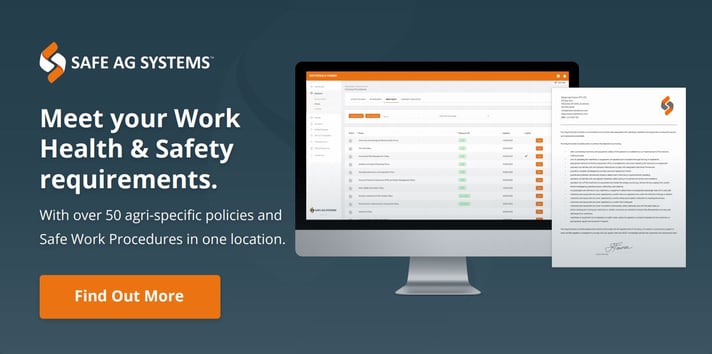New to farm safety and not sure where to start? We've got a guide made just for you.
When assessing workplace risks, physical hazards are often the first to come to mind. But on the farm, it's not just physical dangers you need to be aware of.
Psychosocial hazards are just as important. These are factors that can cause psychological harm and impact mental health. Over time, ongoing exposure to these risks can also take a toll on physical health.
So, what do psychosocial hazards look like in agriculture? Let’s explore how they show up on the farm and what you can do to manage them.
Legislative Changes and National Guidelines
While psychosocial hazards have long existed in the workplace, it’s only in recent years that they’ve been formally recognised under safety legislation.
In 2018, an independent review of Australia’s Work Health and Safety legislation recommended 34 changes, including clearer guidance on managing psychological risks. In response:
-
Safe Work Australia released the Model Code of Practice: Managing Psychosocial Hazards at Work in 2022.
-
Amendments to the Work Health and Safety Regulations 2011 to include psychosocial hazards came into effect in April 2023.
-
Each state and territory is responsible for implementing these changes. Most have already done so, with Victoria set to follow from 1 December 2025.
These updates aim to provide practical guidance for employers and workers to identify and manage psychosocial hazards more effectively.
What are Psychosocial Hazards in the workplace?
Psychosocial hazards aren’t always easy to identify. But it's important to consider if your workplace is taking a mental toll on your employees.
Examples of workplace psychosocial hazards:
-
Excessive workloads and job demands
-
Violence and aggression
-
Low Job control
-
Harassment and sexual assault
-
Traumatic events
-
Remote, isolated or poor work environment
-
Inadequate reward and recognition
They may not have a physical effect on you, but mentally, they’d have a significant impact on your mental health.
Safe Work Australia reports 7,984 Australians are compensated each year for work-related mental health conditions.
Psychological injuries usually have longer recovery times, higher costs and mean more time away from work than physical injuries.
How does it affect Agriculture?
Farmers live and breathe their work. Many don’t get a chance to ‘switch off’ from the stress of the industry.
With the introduction of these amendments, you might be wondering, does this mean more work for you? The answer is no.
Australian workplaces have always had to manage psychosocial hazards. These regulations are designed to provide clear guidelines on how to reduce or remove psychosocial hazards.
Consider the psychosocial hazards mentioned above. Several of those apply to farming.
Job demands can increase in peak periods, such as harvest. You may have highly repetitive and monotonous work during picking season.
You could have seen a traumatic event like your mate in an accident.
The impacts of hazards like these don’t go away. The stress and anxiety linger until it takes a mental and then physical toll. This is when accidents around machinery or equipment are more likely to occur.
As a Person Conducting a Business or Undertaking (PCBU), you must eliminate or minimise psychosocial hazards in the workplace so far as is reasonably practicable.
As a Worker, you are responsible for your own duty of care and that of others around you.
By introducing new guidelines to identify and control psychosocial hazards, employers will be better equipped to manage them.
Managing Psychosocial Hazards on Farm
While not all psychosocial hazards can be prevented, they can be controlled.
The key to controlling psychosocial hazards is consultation. Start by communicating with your workers about how they feel on-site.
Are the hours too long with too little breaks? Do you have a poor workplace culture? Are they uncertain about their job tasks or expectations? Are workers violent or aggressive to one another?
Assessing the psychosocial hazards currently in your workplace will make it easier to control them.
Steps to take:
-
Talk with workers about their experiences and concerns
-
Monitor workloads and ensure adequate breaks
-
Set clear job expectations and responsibilities
-
Address inappropriate behaviour promptly
-
Support remote or isolated workers with regular check-ins
-
Encourage healthy routines and work-life balance
To support you in managing psychosocial hazards in your business, Safe Ag Systems offers a 'Psychosocial Safety Policy' template, available directly within the software.
Addressing psychosocial hazards is a crucial step in creating a safe work environment. Agriculture can be as mentally taxing as it is physically. We all know that. By creating a safe workplace, you’re not only protecting your employees but also contributing to a happier workforce.
Disclaimer: Content on this website may be of relevance to users outside of Australia, but content links and examples are specific to Australia. Please check with your local authority for your country and industry requirements.











